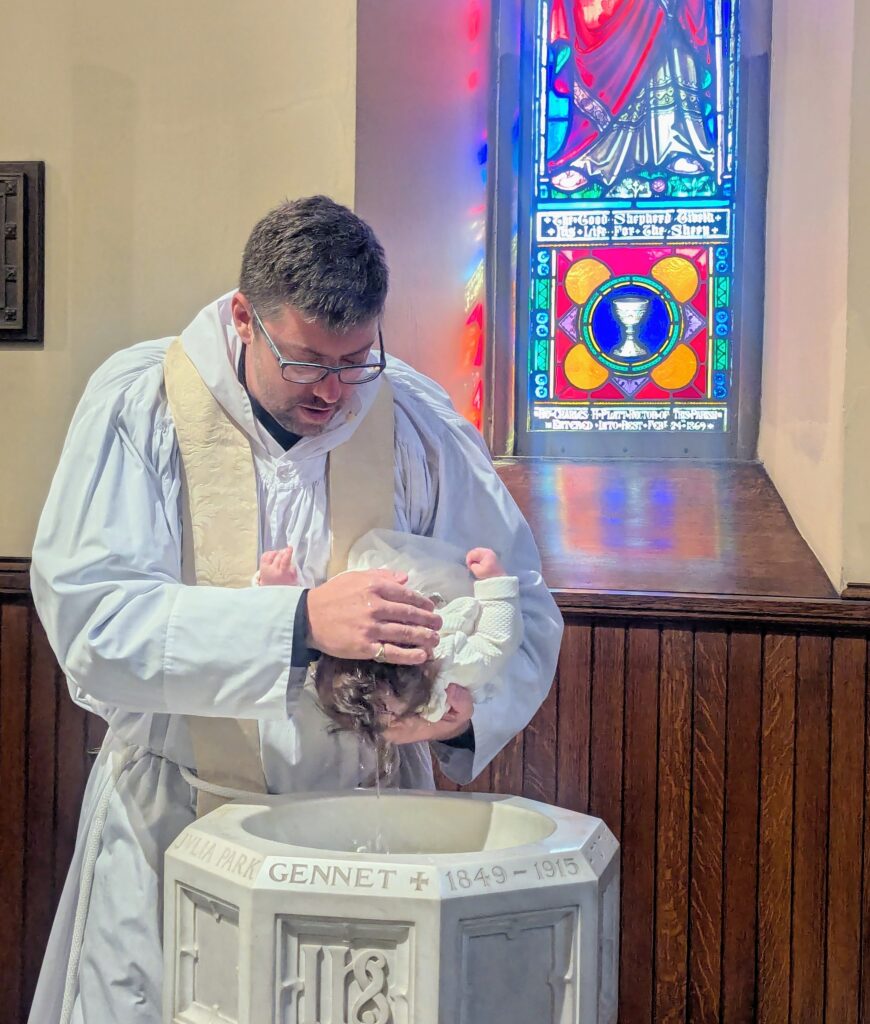Baptism: A Sacrament of New Life
In the Episcopal Church, Holy Baptism is one of two great sacraments given by Christ to the Church (the other being Holy Eucharist). Baptism is the full initiation by water and the Holy Spirit into Christ’s Body, the Church. It is not merely a symbol or a rite of passage—it is a sacramental encounter with God’s grace that marks the continuing journey of a lifelong faith.
Through baptism, we are:
– United with Christ in his death and resurrection
– Forgiven of our sins
– Reborn as children of God
– Made members of Christ’s Body, the Church
– Empowered to live in the Holy Spirit

Baptism is offered once and for all—it is indelible and need not be repeated. Baptisms occur on set days throughout the year:
- The Feast of the Baptism of our Lord (the Sunday after January 6)
- The Easter Vigil (the Saturday before Easter; late March to mid-April) – the traditional night of Adult Baptisms
- Pentecost (fifty days after Easter; mid-May to early June)
- All Saints Sunday (the Sunday after November 1)
The Baptismal Covenant
At the heart of Episcopal baptismal theology is the Baptismal Covenant, a solemn and joyful declaration of faith and commitment. It is both a personal promise and a communal affirmation. During the liturgy of baptism, candidates (or sponsors speaking for them) affirm their faith by reciting the Apostles’ Creed and making five vows that shape the Christian life:
- Will you continue in the apostles’ teaching and fellowship, in the breaking of bread, and in the prayers?
- Will you persevere in resisting evil, and, whenever you fall into sin, repent and return to the Lord?
- Will you proclaim by word and example the Good News of God in Christ?
- Will you seek and serve Christ in all persons, loving your neighbor as yourself?
- Will you strive for justice and peace among all people, and respect the dignity of every human being?
Each vow is answered with: “I will, with God’s help.”
This covenant is renewed regularly—especially at the Easter Vigil and other major baptismal feasts—and shapes how Episcopalians understand their mission and identity in the world.
Baptismal Preparation and a Lifelong Journey of Faith
To become a candidate for Baptism at Christ Church, one must be involved in the life of the parish: regular in corporate worship, supportive of our service ministries, and engaged in Christian education. The Episcopal Church teaches that the baptized life is one of ongoing transformation. We are called to grow in faith, deepen our discipleship, and renew our commitment to Christ day by day. Whether you are considering baptism for yourself or for your child, we welcome you into a community where grace is lived, shared, and renewed in every generation.
Prior to Baptism, candidates undergo a formal period of formation known as “the Catechumenate.” This ancient tradition of the Church aims to shepherd baptismal candidates as they form a life of faith. Catechumens are expected to be regular in worship, engage with our outreach ministries, and attend faith formation classes. If the candidate is a young child, it is expected that the parents engage in this formational work, so that they may live into their vows of raising up the child in the Christian faith and life.
It is important to remember that Baptism is not an end—it is the formal celebration that God has begun a good work in you. In the Episcopal Church, baptism is available to all people, regardless of age, race, gender, or sexuality.
Why We Baptize Infants
In the Episcopal Church, baptism is available to all people, regardless of age. Infant baptism reflects our belief that God’s grace is a gift, not something we earn through understanding or merit. Just as infants are born into a family without having to achieve it, so too are they welcomed into the household of God by grace.
When infants are baptized, parents and godparents (sponsors) make the Baptismal Covenant on their behalf and vow to raise the child in the Christian faith and life. As the child grows, they are nurtured by the Church and, at Confirmation, take on those baptismal promises for themselves.
Infant baptism is an ancient and affirming sign of God’s unconditional love. It also reminds the entire congregation of their shared responsibility to support one another in the life of faith.
